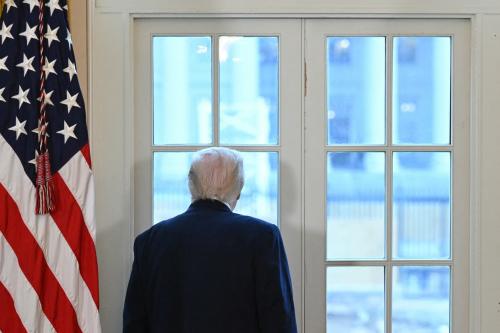There may not be enough chocolate in the world to heal the divisions created by last month’s impeachment debate in the House, but Members should keep the March 19 to 21 Hershey, Pa., Congressional retreat on their calendars nonetheless.
Uncomfortable though it might be for Democrats and Republicans to break bread together, the retreat will give them a rare opportunity to begin rebuilding the comity lost over the long march to impeachment.
Like its 1997 predecessor, the 1999 retreat will not eliminate partisanship. The founder of the retreat, now-retired Colorado Democratic Rep. David Skaggs; its current co-chairmen, Rep. Tom Sawyer (D-Ohio) and Rep. Ray LaHood (R-Ill.); and its present funder, the Pew Charitable Trusts, never argued that it would.
To paraphrase James Madison, if all legislators were angels, there would be no need for Hershey, let alone all the checks and balances embedded in the Constitution.
Rather, the first Hershey retreat was designed to change how the partisanship is expressed. Americans who tune in for momentous debates ought to hear impassioned speeches and witness intense emotions. To imagine a debate about impeachment without strong words, raised voices and stern language is to imagine a democratic process stripped of all the emotion that makes democracy, well, democratic. But that does not mean Americans should also witness name-calling, petty insults and playground shoving. Great debates, partisan or not, demand great rhetoric.
That is pretty much what the House delivered during the impeachment debate. There was partisanship to be sure, but Members seemed to know that Americans were watching. With LaHood presiding over the debate, Members mostly avoided the personal attacks and accusations that marked Congressional debate in the first two years following the Republican takeover in the 1994 election.
This is not to suggest that the impeachment debate was either boring or nice. It was heated and often angry. But even when they criticized their colleagues, as many on both sides did, they never focused on personality as the core frailty. It was a nearly perfect example of an intensely partisan debate conducted within the confines of a genuinely civil process.
Nevertheless, the debate took its toll. “Friendships have been lost in this House today,” Rep. Charles Rangel (D-N.Y.) said after the first article of impeachment was passed. “There is a cloud on the House and I don’t see how after the vote that suddenly the doors will be thrown open.”
The House can survive without Hershey, of course, as witnessed by the underlying civility of the impeachment debate. Yet, assuming that the Senate has acted on impeachment by March, Hershey could give the House a brief timeout from the legislative process, allowing Members to replenish the reservoir of respect that might smooth the edges of their increasingly polarized institution.
It is that reservoir that led Republicans and Democrats to rise in common ovation when Speaker-designate Bob Livingston (R-La.) announced his resignation, and to rise again when Minority Leader Richard Gephardt (D-Mo.) pleaded for an end to the “politics of smear and slash and burn.” And it is that reservoir that might allow ordinary Americans a brief glimpse of bipartisanship in an otherwise partisan moment of history.
No one believes the second retreat will be comfortable. Even the retreat’s most loyal alumni must be wondering how they will bear the three-hour train ride to Hershey after such partisanship, let alone abide two days of close contact with the other party. Nor does anyone believe that Rep. Patrick Kennedy (D-R.I.) will sit at the same table with Rep. Bob Barr (R-Ga.), whom Kennedy labeled a racist during the impeachment debate. And nobody expects Barr to seek reconciliation with Kennedy, whom he ridiculed in response.
But the potential gains from two days in Hershey are undeniable. All Members, regardless of party, need to see that their opponents are human, flawed though the opposition’s position may seem. Members also have good reason to acknowledge the commitment to public service that binds the institution. They may not share agreement on impeachment, but all share a common honor as representatives of the people, which is precisely why the first Hershey retreat was so refreshing for the Members who attended. With every spare minute taken, Members barely have time to become colleagues, let alone friends.
Two days in Hershey cannot heal the divisions that led Kennedy and Barr to rhetorical blows. Nor can it repair the friendships lost in the heat of partisan debate. But it can remind Members why they came to Congress in the first place.
Much as they disagree, Kennedy and Barr share at least one patch of common ground: They were both honored by their election to Congress. The second Hershey retreat is one place to be reminded that such pride crosses party lines. Democrats and Republicans alike should make sure the date is on their calendars.
Paul C. Light is the Douglas Dillon senior fellow at the Brookings Institution and was the program director responsible for the first Hershey retreat on behalf of the Pew Charitable Trusts.
The Brookings Institution is committed to quality, independence, and impact.
We are supported by a diverse array of funders. In line with our values and policies, each Brookings publication represents the sole views of its author(s).



Commentary
Op-edThe Time Has Come for House Members to Return to Hershey
January 11, 1999